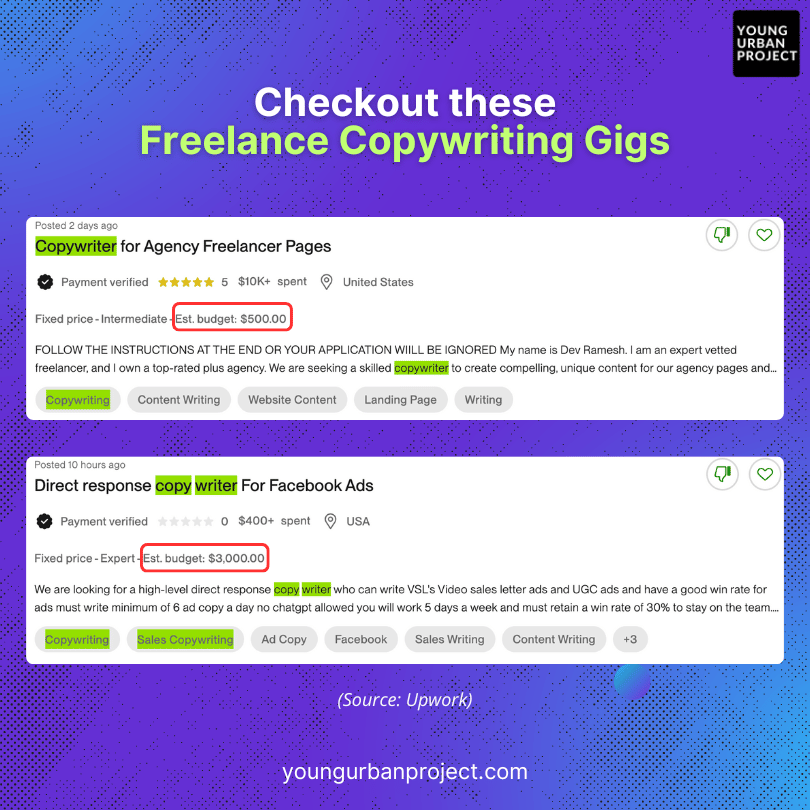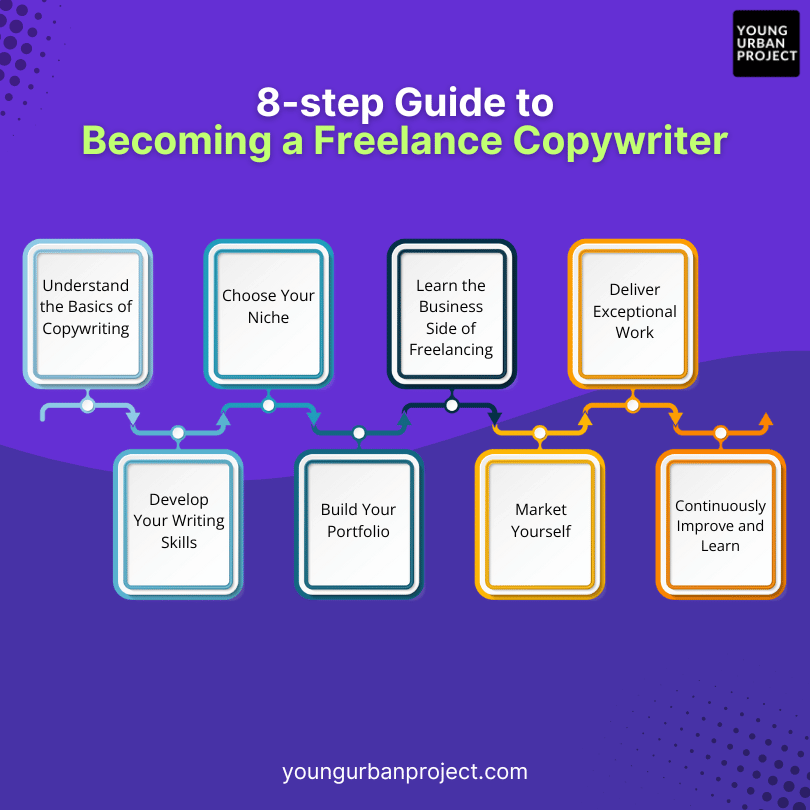Are you interested in a career where you can work from anywhere, set your own hours, and use your creativity to help businesses succeed? If you answered “yes”, becoming a freelance copywriter might be the perfect path for you.
In this step-by-step guide, we will explore everything you need to know about becoming a successful freelance copywriter, someone who is a maestro when it comes to writing online ads, landing pages, emails, VSLs, websites, and more.
Table of Contents
What is Freelance Copywriting?
Freelance copywriting involves writing persuasive and engaging content for various media such as websites, advertisements, emails, landing pages, and video sales letters (VSLs) on a contract basis. Unlike in-house copywriters who work for a single company (or brand), freelance copywriters have the freedom to work with multiple clients and choose their projects.
Why Choose Freelance Copywriting?
Freelance copywriting offers quite a few benefits, including:
- Flexibility: Work from anywhere and set your own hours.
- Diverse Projects: Work on various projects across different industries.
- Income Potential: As you gain experience and build a portfolio, you can command higher rates. (Checkout the image below to see the type of projects/gigs you can find on Upwork)
- Creative Freedom: Express your creativity and help businesses succeed.

What Does a Freelance Copywriter Do?
Freelance copywriters play a crucial role in creating persuasive and engaging content that drives action and helps businesses achieve their marketing goals. Here’s an in-depth look at the various tasks and responsibilities a freelance copywriter typically handles:
1. Writing Copy for Various Media
Freelance copywriters create content for a wide range of platforms and formats, including:
- Advertisements: Crafting compelling ad copy for online and offline campaigns.
- Landing Pages: Writing persuasive content to convert visitors into leads or customers.
- Emails: Developing engaging email campaigns that drive open rates and conversions.
- Websites: Creating website copy that communicates brand messages and enhances user experience.
- Video Sales Letters (VSLs): Writing scripts for videos that sell products or services.
2. Conducting Research
Effective copywriting is grounded in thorough research. Freelance copywriters spend a significant amount of time:
- Understanding the Product/Service: Learning about the client’s offerings to highlight unique selling points.
- Analyzing the Target Audience: Identifying the needs, pain points, and motivations of the audience.
- Competitor Analysis: Studying competitors’ strategies to find gaps and opportunities for differentiation.
3. Collaborating with Clients
Freelance copywriters work closely with clients to ensure the content aligns with their brand voice and marketing objectives. This involves:
- Initial Consultations: Discussing project goals, target audience, and specific requirements with clients.
- Revisions and Feedback: Making revisions based on client feedback to refine the copy.
- Ongoing Communication: Maintaining clear and consistent communication throughout the project to ensure alignment and address any issues promptly.
4. Implementing SEO Strategies
For online copy, SEO is a critical component. Freelance copywriters:
- Conduct Keyword Research: Identify relevant keywords to target in the copy.
- Optimize Content: Use keywords strategically in headlines, meta descriptions, and body text without compromising readability.
- Stay Updated on SEO Trends: Keep abreast of the latest SEO best practices and algorithm changes to ensure the content remains effective.
5. Editing and Proofreading
Quality assurance is vital in copywriting. Freelance copywriters meticulously:
- Proofread for Errors: Check for grammar, spelling, and punctuation mistakes.
- Edit for Clarity and Flow: Ensure the copy is clear, concise, and logically structured. Use a free paraphrasing tool to eliminate vagueness and boost content readability
- Maintain Consistency: Ensure the content aligns with the brand’s voice and style guidelines.
6. Project Management
Freelance copywriters often manage multiple projects simultaneously, requiring strong organizational skills. This includes:
- Time Management: Prioritizing tasks and meeting deadlines.
- Client Relations: Managing client expectations and maintaining professional relationships.
- Billing and Invoicing: Handling the financial aspects of freelancing, such as creating invoices and tracking payments.
7. Marketing Their Services
We see a lot of aspiring copywriters overlook this aspect completely. Being a successful freelancer is a mix of having the necessary hard skills, and promotiong your services to bring in new clients (and retaining existing ones).
To sustain a steady flow of projects, freelance copywriters also need to market themselves. This involves:
- Building an Online Presence: Creating a professional website and maintaining active profiles on social media (like LinkedIn, X, Instagram) and freelance platforms (like Upwork, Fiverr etc).
- Networking: Connecting with potential clients, other freelancers, and industry professionals.
- Showcasing Expertise: Writing blog posts, guest articles, and case studies to demonstrate expertise and attract clients.
8. Continuous Learning and Development
The world of copywriting and digital marketing is constantly evolving. Freelance copywriters stay competitive by:
- Taking Courses and Workshops: Enhancing skills and learning new techniques. Young Urban Project’s AI-Powered Copywriting Course is a great way to learn the skills in the most in-depth way.
- Reading Industry Publications: Keeping up with the latest trends, tools, and best practices.
- Seeking Feedback: Regularly soliciting feedback from clients and peers to improve their craft.

CheckOut Our: Advanced Copywriting Course
Skills Required to Become a Freelance Copywriter
To thrive as a freelance copywriter, it’s essential to develop a specific set of skills. These skills will not only help you craft compelling copy but also manage your freelance business effectively. Here’s a breakdown of the key skills you need to succeed:
1. Writing Skills
At the core of copywriting is the ability to write well. This involves more than just correct grammar and spelling; it’s about writing persuasively and engagingly. You need to:
- Understand Tone and Style: Adapt your writing style to fit different brands and audiences.
- Craft Compelling Headlines: Write headlines that grab attention and entice readers to continue.
- Write Clear and Concise Copy: Communicate messages effectively without unnecessary fluff.
Also Read: How to become a Content Writer
2. Research Skills
Good copy is based on solid research. You need to:
- Understand the Product/Service: Know the ins and outs of what you’re writing about.
- Identify the Target Audience: Understand who you’re writing for and what motivates them.
- Analyze Competitors: Study competitors’ copy to find gaps and opportunities.
3. SEO Knowledge
In online copywriting, understanding SEO (Search Engine Optimization) is crucial. You need to:
- Keyword Research: Identify the right keywords to target.
- On-Page SEO: Implement keywords naturally in your copy, including headlines, meta descriptions, and body text.
- SEO Best Practices: Stay updated with the latest SEO trends and algorithms.
4. Creativity
Creativity sets great copy apart from good copy. This includes:
- Idea Generation: Brainstorm unique angles and ideas.
- Storytelling: Weave narratives that engage and persuade readers.
- Problem-Solving: Find creative solutions to clients’ challenges.
5. Attention to Detail
Precision is key in copywriting. You need to:
- Proofread and Edit: Ensure your copy is error-free and polished.
- Follow Guidelines: Adhere to client briefs and brand guidelines.
- Fact-Check: Verify all information for accuracy.
6. Time Management
As a freelancer, managing your time effectively is crucial. You need to:
- Meet Deadlines: Deliver projects on time, every time.
- Prioritize Tasks: Balance multiple projects and deadlines.
- Stay Organized: Keep track of assignments, deadlines, and client communications.
7. Marketing Knowledge
Understanding marketing principles can significantly enhance your copywriting. You need to:
- Know the Sales Funnel: Understand different stages of the sales funnel and write copy accordingly.
- Use Persuasion Techniques: Apply psychological principles to persuade and convert readers.
- Measure Success: Understand metrics and analytics to gauge the effectiveness of your copy.
8. Communication Skills
Strong communication is vital for working with clients. You need to:
- Understand Client Needs: Listen actively and ask the right questions.
- Provide Updates: Keep clients informed about project progress.
- Handle Feedback: Accept constructive criticism and make necessary revisions.
9. Adaptability
The world of copywriting is ever-evolving. You need to:
- Stay Current: Keep up with industry trends and changes.
- Learn New Tools: Familiarize yourself with the latest copywriting tools and software.
- Adapt to Different Clients: Be flexible in your approach to meet diverse client needs.
10. Networking
Building a network can open up new opportunities. You need to:
- Connect with Other Writers: Join writing groups and forums.
- Attend Industry Events: Participate in webinars, workshops, and conferences.
- Leverage Social Media: Use platforms like LinkedIn to network and showcase your work.
Also Read: What is Conversion Copywriting?
Different Types of Copywriting
Copywriting is a versatile field with various specializations, each requiring unique skills and approaches. Understanding the different types of copywriting can help you decide which area to focus on and enhance your freelance career. Here’s an overview of the main types of copywriting:
1. SEO Copywriting
SEO (Search Engine Optimization) copywriting focuses on creating content that ranks well on search engines. The goal is to drive organic traffic to websites by optimizing content for specific keywords and phrases.
- Key Elements: Keyword research, on-page SEO, meta descriptions, internal linking.
- Typical Projects: Blog posts, website content, landing pages.
2. Ad Copywriting
Ad copywriting involves creating persuasive and engaging content for advertisements. This type of copywriting is crucial for capturing attention and driving conversions through paid channels.
- Key Elements: Catchy headlines, compelling calls-to-action (CTAs), concise messaging.
- Typical Projects: Google Ads, social media ads, display ads.
3. Direct Response Copywriting
Direct response copywriting aims to elicit an immediate response from the audience, such as making a purchase or signing up for a newsletter. It’s all about driving direct action and measuring results.
- Key Elements: Strong CTAs, urgency, benefits-focused language.
- Typical Projects: Sales letters, email marketing, infomercials.
4. Email Copywriting
Email copywriting is the art of crafting emails that engage, nurture, and convert subscribers. Effective email copywriting builds relationships and guides recipients through the sales funnel.
- Key Elements: Personalized content, engaging subject lines, clear CTAs.
- Typical Projects: Newsletters, promotional emails, drip campaigns.
5. Content Marketing Copywriting
Content marketing copywriting focuses on creating valuable, relevant content to attract and retain a clearly defined audience. It’s more about informing and educating rather than direct selling.
- Key Elements: Educational content, storytelling, SEO.
- Typical Projects: Blog posts, whitepapers, eBooks.
Also Read: Copywriting vs Content Writing
6. Social Media Copywriting
Social media copywriting involves creating content tailored for social media platforms. It requires an understanding of each platform’s nuances and the ability to engage users in a conversational tone.
- Key Elements: Brand voice consistency, brevity, hashtags.
- Typical Projects: Social media posts, captions, sponsored content.
7. Website Copywriting
Website copywriting encompasses all the content on a website, from the homepage to product descriptions. The goal is to provide information, enhance user experience, and drive conversions.
- Key Elements: Clear navigation, SEO, user-focused content.
- Typical Projects: Homepages, about pages, product/service pages.
8. Video Script Copywriting
Video script copywriting involves writing scripts for various types of videos, including explainer videos, commercials, and VSLs. It requires a strong understanding of visual storytelling and pacing.
- Key Elements: Engaging openings, clear narrative flow, strong CTAs.
- Typical Projects: Explainer videos, video ads, webinars.
9. Technical Copywriting
Technical copywriting is specialized content aimed at a technical audience. It requires the ability to explain complex concepts in a clear and concise manner.
- Key Elements: Technical accuracy, clarity, user-friendly language.
- Typical Projects: User manuals, product descriptions, technical blogs.
10. Brand Copywriting
Brand copywriting focuses on building and maintaining a brand’s voice and identity. It’s about creating a consistent tone across all marketing materials to build brand recognition and loyalty.
- Key Elements: Brand voice consistency, storytelling, emotional appeal.
- Typical Projects: Brand guidelines, taglines, mission statements.
Step-by-Step Guide to Becoming a Freelance Copywriter

1. Understand the Basics of Copywriting
Before diving into freelance copywriting, it’s essential to understand the basics. Copywriting is all about crafting persuasive messages that drive action. Whether it’s an ad, a landing page, or an email, the goal is to convince the reader to take a specific action.
2. Develop Your Writing Skills
To become a successful copywriter, you need to develop strong writing skills. Here are a few tips:
- Read Extensively: Read books, blogs, and articles to understand different writing styles.
- Practice Writing: Write regularly to improve your writing skills. Start a blog, write guest posts, or create sample pieces.
- Study Copywriting: Learn from the experts. Books like “The Adweek Copywriting Handbook” by Joseph Sugarman and “Made to Stick” by Chip Heath and Dan Heath are great resources.
3. Choose Your Niche
Specializing in a niche can help you stand out in a competitive market. Some popular niches include:
- Digital Marketing: Writing for online ads, landing pages, and social media.
- Email Marketing: Crafting persuasive email campaigns.
- Content Marketing: Writing blog posts, articles, and website content.
- Direct Response: Creating direct mail, VSLs, and sales pages.
4. Build Your Portfolio
Your portfolio is your calling card. It showcases your skills and helps potential clients assess your expertise. Here’s how to build a strong portfolio:
- Create Samples: Write sample pieces for different niches. Use hypothetical companies or volunteer to write for non-profits.
- Start a Blog: Use your blog to showcase your writing style and knowledge.
- Guest Post: Write guest posts for reputable blogs and websites to gain exposure.
5. Learn the Business Side of Freelancing
Freelance copywriting is not just about writing; it’s also about running a business. Here are some essential business skills you need:
- Pricing Your Services: Research the market rates and set competitive prices.
- Contracts and Invoicing: Use contracts to protect your work and get paid on time.
- Client Management: Develop strong communication and project management skills.
6. Market Yourself
To attract clients, you need to market yourself effectively. Here are some strategies:
- Create a Website: A professional website showcases your portfolio and services.
- Use Social Media: Leverage platforms like LinkedIn, Twitter, and Instagram to network and share your work.
- Join Freelance Platforms: Sign up on platforms like Upwork, Freelancer, and Fiverr to find clients.
- Network: Attend industry events, join online communities, and connect with other professionals.
7. Deliver Exceptional Work
Your reputation as a freelance copywriter depends on the quality of your work. Here are some tips for delivering exceptional work:
- Understand the Client’s Needs: Listen to your clients and understand their goals.
- Research: Conduct thorough research to create compelling and accurate copy.
- Edit and Revise: Proofread your work to eliminate errors and ensure clarity.
8. Continuously Improve and Learn
The world of copywriting is constantly evolving. Stay ahead of the curve by:
- Taking Courses: Enroll in copywriting courses to learn new skills and techniques.
- Staying Updated: Follow industry blogs, podcasts, and news to stay informed about trends.
- Seeking Feedback: Ask for feedback from clients and peers to improve your work.
Final word
Becoming a freelance copywriter is a rewarding career path that offers flexibility, creative freedom, and the potential for high earnings. By following the steps outlined in this guide, you can develop the skills and knowledge needed to succeed in the competitive world of freelance copywriting. Remember to continuously improve, market yourself effectively, and deliver exceptional work to build a successful freelance copywriting career.

